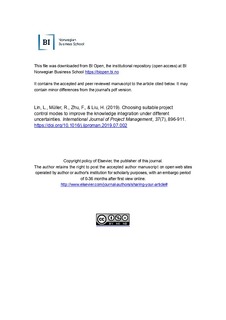Choosing suitable project control modes to improve the knowledge integration under different uncertainties
Journal article, Peer reviewed
Accepted version
Permanent lenke
http://hdl.handle.net/11250/2633675Utgivelsesdato
2019Metadata
Vis full innførselSamlinger
- Publikasjoner fra CRIStin - BI [1015]
- Scientific articles [2181]
Originalversjon
International Journal of Project Management. 2019, 37 (7), 896-911. 10.1016/j.ijproman.2019.07.002Sammendrag
This paper examines how to design project control modes to improve knowledge integration under different types of uncertainty. Uncertainty can be the precondition of project control choice, and it gives rise to the differing relations between project control (behavior, outcome, clan and self) and knowledge integration. We have conducted a multiple case study from the engineering, software, machinery and infrastructure industries, and examined the project controls design effectively dealing with high uncertainties. On the basis of control theory and knowledge-based theory, this article compares project control modes impact from the three knowledge integration dimensions of efficiency, scope and flexibility. Findings suggest that behavior control improves knowledge integration efficiency under uncertainty related to computational complexity, self-control improves knowledge integration efficiency under uncertainty related to project novelty, clan control enhances knowledge integration flexibility under uncertainty related to ambiguity of user requirements, outcome control enhances knowledge integration scope under uncertainty related to technological complexity. These findings are integrated into a model of the choice of project controls. Implications of these results are drawn, and directions for future research are suggested.

